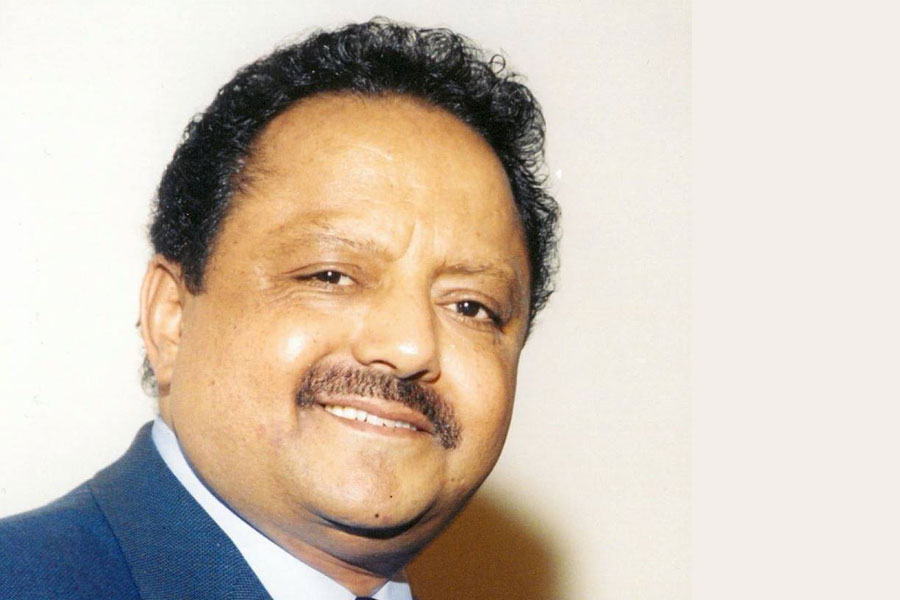
Films Review | Jan 03,2021
As the ethereal notes of the ASLI EthioJazz band filled the Africa Jazz Village, paying homage to the late Getachew Kassa with the iconic farewell song "Amesegenalehu," the audience experienced a mix of sombre reflection and celebratory acknowledgement of a musical luminary. Jorga Mesfin's saxophone added a poignant layer to the performance, eliciting emotions from those who held nostalgic adoration for the star.
The lyrics of the 1980s song, a composition by the legendary singer himself, seemed to unfold at a serendipitous moment, encapsulating Getachew's enduring gratitude for the decades-long love affair with his fans and fellow musicians. The instrumental rendition concluded, leaving the audience in a state of emotional resonance, and the performance was punctuated by ululations from an enraptured woman, infusing real-time ecstasy into the atmosphere.
Getachew Kassa's life was a narrative of extraordinary dimensions. Born in the heart of the capital Merkato area, he embodied the essence of a city boy whose musical odyssey traversed the landscapes of both Ethiopian and international genres. The genesis of his vocal journey is traced back to his encounter with an Italian song, "Azmerina," during his formative years. Unbeknownst to the six-year-old Getachew, this encounter marked the inception of his deep-seated passion for vocal expression. Playing alongside avant-garde musicians, he delved into Italian and English songs, showcasing a remarkable musical versatility that would later define his illustrious career.
The universality of Getachew's musical prowess resonated when Bob Dylan, the iconic American musician, selected Getachew's magnum opus, "Tizita," as the 12th track in his prestigious all-time best selection album. This rare acknowledgement elevated Getachew to a global stage, underlining his significance in the realm of folk music. Collaborating with the legendary Cameroonian saxophonist and songwriter Manu Dibango on "Mama Se Mama Sa Mama Coo Sa," further solidified Getachew's international influence. Notably, this same song was later sold by Dibango to Michael Jackson for five million dollars, cementing Getachew's impact on global music.
What distinguished Getachew's musical identity was not merely his international acclaim but the soul-stirring tenor of his voice and the effortless, yet captivating, romantic touch he imparted to each melody. Onstage, he was a flamboyant figure, marked by signature swinging hand movements, an Afro hairstyle, and stylish attire. His stage presence exuded an extroverted expressionism that was immediately infectious to his audience. Beyond the stage, in his personal life, he embraced a philosophy of simplicity that transcended the complexities of human nature and life, fostering resilience and longevity.
Getachew's journey was not without its societal challenges. Faced with the lowly opinion held for artists in the past, he made the pivotal decision to forsake his surname, Tsegaye. Born to a businessman father, Getachew assumed his girlfriend at the time, Asegedech Kassa's surname. This decision, driven by the societal stigma associated with artistic professions, eventually garnered acceptance from his father after an impactful performance at the Addis Hilton.
In the morning after learning about Getachew’s demise, I was listening to his patriotic epic song for his motherland in my earbuds. The song titled Ageren Atinkuat “Don’t Harm My Country” brought tears to my eyes.
“A mother for the diverse multitudes,
Which we call our refuge,
It is indeed our mama,
Please don’t harm my country…”
The ebb and flow of his mesmerising voice with the slow melody that graciously flowed and the lyrics were timeless and a testament to the true legend. He performed it in a heartfelt manner without being consciousness of the audience. I believe that the adherence to his nationality throughout the 28 years he lived in the US is another testament to his devotion to Ethiopia.
Like many artists of his generation, Getachew spent significant years abroad, absent from the local music scene. His return after a long while marked a resurgence with studio recordings alongside the Ethio Star band and memorable performances on the previous Ethiopian Television (ETV). These recordings, capturing his unique style and magnetic presence, stand as invaluable records preserving the essence of an era.
One of Getachew's emotive compositions, "Kena Biyew Sayew Semay Deferse" (When I look up the sky darkened), seemed to encapsulate the story of his extended period in exile. The melancholic melody and poignant lyrics delved into the life of those languishing away from their homeland, exploring the themes of homesickness and the trials of living abroad. For a person as sentimental as Getachew, the song carried a nostalgic and touching weight, resonating even with those untouched by the experience of exile.
Returning to Ethiopia in his later years, Getachew was allowed to savour the joy of living among his compatriots. His final days were marked by occasional appearances on TV shows. Even in the face of challenges, he maintained an upbeat mood and greeted each interview with big smiles. His carefree spirit, coupled with a simple perspective on life, likely contributed to his remarkable longevity, living to the ripe age of 80.
Beyond his vocal talents, Getachew showcased proficiency in various musical instruments, including drums and harmonica. In an interview with a TV host, he brandished a harmonica from his pocket, playing a famous melody that underscored his versatility. His affinity for the harmonica drew parallels with Bob Dylan, a fellow harmonica enthusiast who wielded it alongside his guitar during performances. Despite his advanced age, Getachew's passion for music remained undiminished, as exemplified by his tears of joy upon receiving a Yamaha keyboard from contemporary musician Michael Belayneh, who recorded one of his songs.
The news of Getachew's passing prompted an outpouring of tributes, with radio stations playing his timeless pieces and a grand funeral held at the Holy Trinity Church. As his ashes found their resting place in the city he loved and sang about – Addis Abeba – the humble city boy from Arada left an indelible mark on the hearts of his fans. Getachew had lavished praise on the city he held dear, a city that had flourished in the last decade of his life. In death, he returned to the embrace of the city and its people, leaving behind a legacy that transcends time and resonates through the corridors of Ethiopian music history.
As Getachew said in one of his interviews, he lost count of the numerous songs he had created. The depth, colour and quality of his music endure, making him an icon in the hall of fame that defined the Golden era of Ethiopian music – the decades starting in the 1960s through the 1970s. The humble musician leaves behind a legacy that continues to captivate the imagination of millions with his simple yet glorious life.
A conversation with him on one interview concluded with the thunderous crackle of his laughter and a quick recital of James Brown's "I Feel Good!" – a fitting testament to a life lived authentically and joyfully. Indeed, he faced life head-on, with a contagious upbeat attitude. Salute to a true legend, Getachew Kassa!
PUBLISHED ON
Mar 01,2024 [ VOL
24 , NO
1244]


Films Review | Jan 03,2021

In-Picture | May 12,2024

Obituary | May 03,2024

Editorial | May 02,2024

Fortune News | Jun 23,2019

Fortune News | Mar 27,2021

View From Arada | Feb 17,2024

Editorial | Sep 16,2023

Fortune News | May 27,2023

Fortune News | Nov 02,2019

Dec 22 , 2024 . By TIZITA SHEWAFERAW
Charged with transforming colossal state-owned enterprises into modern and competitiv...

Aug 18 , 2024 . By AKSAH ITALO
Although predictable Yonas Zerihun's job in the ride-hailing service is not immune to...

Jul 28 , 2024 . By TIZITA SHEWAFERAW
Unhabitual, perhaps too many, Samuel Gebreyohannes, 38, used to occasionally enjoy a couple of beers at breakfast. However, he recently swit...

Jul 13 , 2024 . By AKSAH ITALO
Investors who rely on tractors, trucks, and field vehicles for commuting, transporting commodities, and f...

Oct 25 , 2025
The regulatory machinery is on overdrive. In only two years, no fewer than 35 new pro...

Oct 18 , 2025
The political establishment, notably the ruling party and its top brass, has become p...

Oct 11 , 2025
Ladislas Farago, a roving Associated Press (AP) correspondent, arrived in Ethiopia in...

Oct 4 , 2025
Eyob Tekalegn (PhD) had been in the Governor's chair for only weeks when, on Septembe...